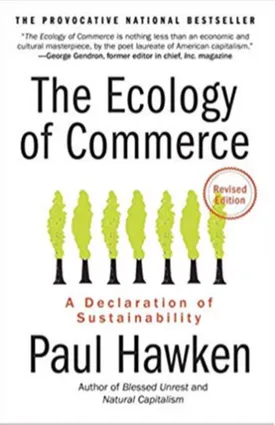The Ecology of Commerce Revised Edition: A Declaration of Sustainability by Paul Hawken
The Ecology of Commerce Revised Edition: A Declaration of Sustainability by Paul Hawken is an updated and expanded view on the well-studied issues of sustainable development and economic stability, largely informed by the progress made since Hawken's initial publication of the book in 1993. Drawing from a 20-year experience of environmental advocacy and business, Hawken employs both his background and emerging science to urge businesses to redefine environmental responsibility and economics in ways that are meaningful, real, and applicable. In this revised edition, Hawken articulates the shift in thinking businesses must adopt to match the promise of a healthier economy and a healthier environment.
The scope of The Ecology of Commerce Revised Edition provides businesses, policy makers, and consumers alike with an effective way of integrating systems of ecology and economics. Hawken directly challenges the current view of "sinning and repenting," which simply looks to businesses to correct past mistakes once it is too late. His five-part framework to sustainably develop companies freely navigates between the thin divide of saving the planet and saving profits. In the first part, Hawken sets up the compelling case for The Natural Capitalist and emphasizes the need for business leaders to view sustainability as an investment and opportunity rather than a cost or hard line. From this basis, Hawken transitions to the second part, The Pillar of Natural Wealth, wherein Hawken expounds upon the principles of an ecologically restorative and financially prosperous economy, laying out a detailed, holistic framework for what sustainability in business should mean.
In the second chapter, The Integrity of Designing, Hawken diagrams an innovative approach to sustainability, an approach to ecological redevelopment through the integration of renewable energy, energy efficiency, and the use of natural capital. His discussion of natural capital includes a series of new economic and environmental evaluation tools, such as Creative Ecology and Maximum Sustainability, that are designed to benefit all stakeholders, such as the local community, without sacrificing profitability. From this section, Hawken moves to the third part, The Interdependence of Activity, which examines structures necessary for societal and ecological equilibrium; structures that enable humans to interact positively and peaceful with their environment. Through this chapter, Hawken highlights the importance of human understanding and integrating of natural systems, describing the need for economies and communities' to embrace connectedness by engaging in mutual reciprocity.
In the book's fourth part, The Partnership of Profit, Hawken emphasizes the importance and value of ethical currency, a concept that brings together environmental, social, and economic values to drive competitive advantage and profitability. Throughout this chapter, Hawken explicitly outlines the need for businesses to consider sustainability in their relations and architecture, connecting the value of sustainability to corporate strategy, and advocating for voluntary corporate compliance. The Ecology of Commerce Revised Edition culminates with the fifth part, The Transformation of Culture, a chapter that calls for both businesses and individuals to go beyond the basic tenets of sustainable development, and to work towards redefining the axioms upon which our culture and economy are based. Through this chapter, Hawken reveals the power of individual, company, and collective action has in mitigating climate change and creating a baseline for a thriving, healthy, and equitable future.
Overall, The Ecology of Commerce Revised Edition provides a comprehensive and inspiring look into the state of the current environmental climate, the relationship between business, society, and the environment, and an actionable guide for businesses, policy makers, and consumers alike to advance sustainability. The book articulates a powerful and viable shift in thinking and action that is imperative if humanity is to combat the environmental crisis, while allowing businesses to maintain their value and opportunity. By presenting innovative approaches to responsible sustainability and meaningful systems of ecological regeneration, Hawken hopes to inspire business capitalizing on the vast opportunities of the green economy, and assist in creation of equitable wealth and a healthier environment for future generations.

